Education
Love Binti Women Empowerment Project Welcomes Record Number of Participants in Latest Intake
Published
2 years agoon
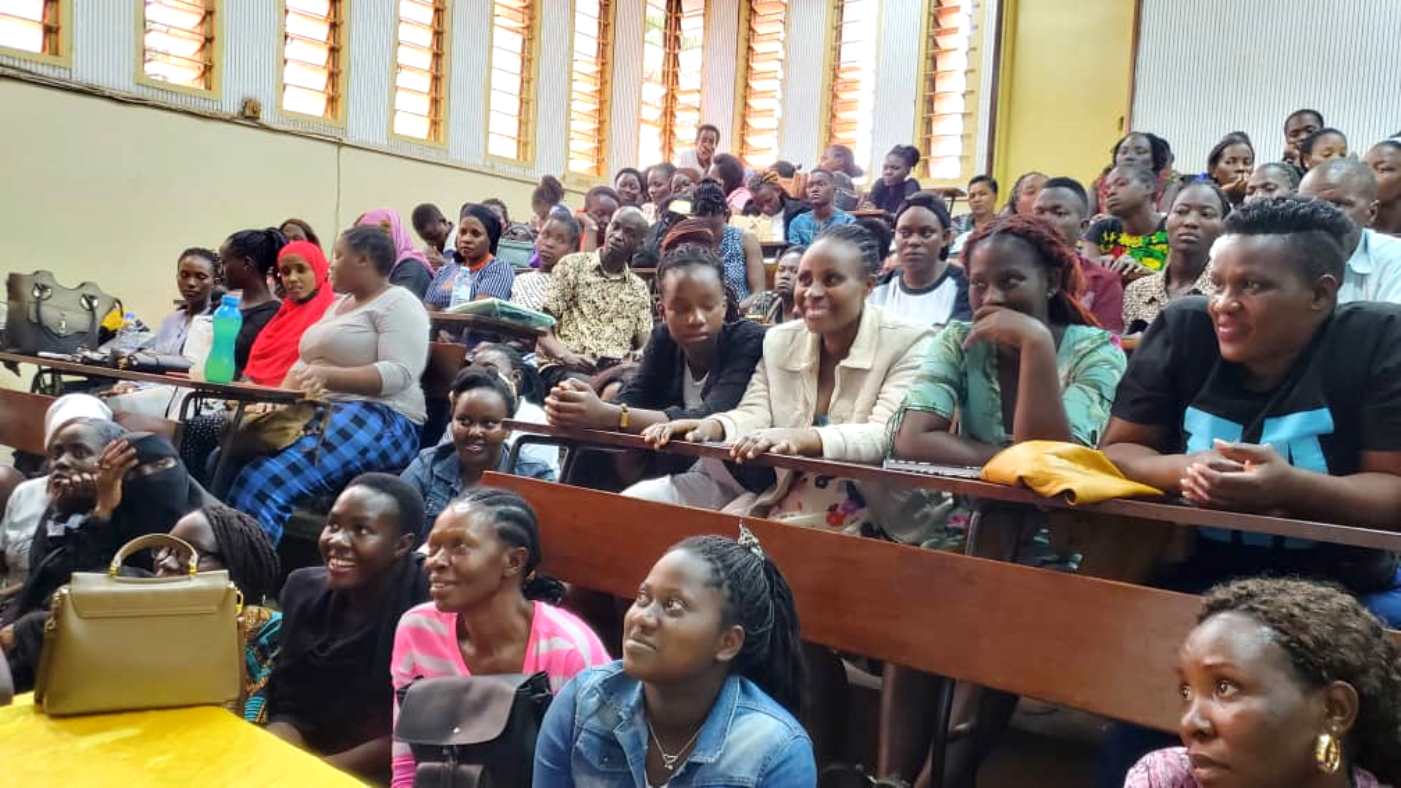
Introduction:
Saturday, September 30th, 2023 marked a significant milestone for the Love Binti Women Empowerment Project, which focuses on equipping communities with valuable fashion and design skills. The project, a collaborative effort between Love Binti International, an international NGO operating in Uganda, and Makerere University‘s College of Education and External Studies in the Department of Adult and Community Education, has been providing training since 2018, offering four intakes annually.
Overflowing Enthusiasm:
The customary orientation for the October-December intake was held at the Lecture Theatre of the Department of Adult and Community Education, the venue of previous orientations. However, what made this particular event stand out was the overwhelming turnout. The venue, which had accommodated orientations for years, was no longer sufficient to accommodate the surge in attendance. Participants spilled into corridors and stairways as the attendance list revealed a staggering 415 attendees out of over 1,000 applicants.
Mr. James Kirinya, the Love Binti Field Assistant, addressed the fortunate attendees during the orientation. He explained that due to the unprecedented number of applicants, not everyone could be invited, and those present were the select few. The atmosphere was charged with optimism and anticipation.
Empowering the Girl Child:
Ms. Hope Katushabe, a trainer in the Love Binti Fashion Course, also assumed the role of Mistress of Ceremony for the day. Her motivational words resonated with the audience as she emphasized the project’s mission: “We are a women’s empowerment project. We care not only about the needs of a woman, but we also know that a woman is a mother, a sister, a wife, and if you empower a woman, you have not only empowered the family, but the entire nation.”
Endorsement from Principal:
Professor Anthony Mugagga Muwagga, the esteemed Principal of the College of Education and External Studies at Makerere University, has played an instrumental role in championing the Love Binti project. His unwavering support and dedication to the program have been crucial in its success. Professor Muwagga’s efforts extend beyond the College, as he passionately advocates for the project to higher authorities whenever inquiries are made.
Adapting to Demand:
Mrs. Okae Suzan Abello, the Country Manager for Love Binti International, informed the participants of the significant impact their attendance had on the Love Binti project. Initially, each intake accommodated a maximum of 60 learners divided into four sessions per week. However, due to the overwhelming response for the October-December intake, a crisis meeting was held to devise a new schedule. The outcome was a new schedule featuring six sessions per week, accommodating a total of 100 learners.
Mrs. Abello assured those unable to secure a place in the current intake that they would automatically be registered for the January-March 2024 intake, following the same schedule.
Expanding Horizons:
Mr. Joseph Watuleke, the Focal Person of Love Binti at Makerere University, also highlighted additional opportunities available at the College of Education and External Studies. Participants with a minimum qualification of senior four and senior six could choose to enroll in the accredited certificate or diploma program in Fashion and Garment Design, examined by the Uganda Business and Technical Examination Board (UBTEB). Mr. Watuleke also introduced accredited undergraduate and postgraduate programs offered by the College.
A Dream Come True:
To the elation of the audience, Mr. Watuleke revealed that upon completing their three-month fashion and design training, participants would receive a Certificate of Training from Makerere University. This announcement was met with overwhelming joy, with one parent sharing his lifelong dream of holding a certificate from Makerere University, an aspiration he never thought possible until now.
Conclusion:
The Love Binti Women Empowerment Project’s October-December intake orientation witnessed an unprecedented surge in attendance, reflecting the program’s growing popularity and impact. With an expanded schedule, new opportunities, and the promise of Makerere University certificates, participants are poised to embark on a transformative journey towards empowerment. Love Binti International, under the steadfast support of Principal Professor Anthony Mugagga Muwagga, and Makerere University are committed to nurturing the aspirations of those who seek to better their lives through education and skills development.
You may like
-
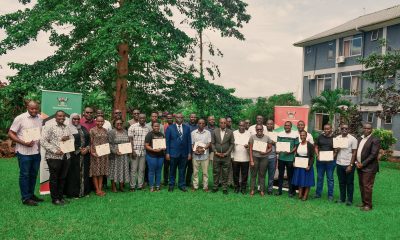

Thirty Public Officers Certified in Integrated Regulatory Cost-Benefit Analysis
-


Botswana Delegation Visits Makerere’s Public Investment Management Centre to Study Sustainable Training Model
-


CAES Presents Overall Best Performing Student in the Sciences & a Record 28 PhDs at the 76th Graduation Ceremony
-


Graduation marks the next phase of accountability, graduates told
-


Over 9,200 to graduate at Makerere University’s 76th Graduation
-
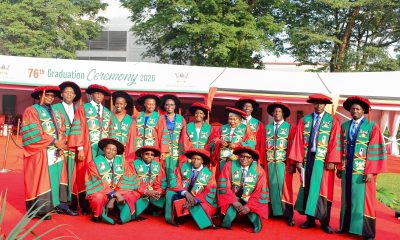

Mak 76th Graduation Ceremony: CEES Celebrates Academic Excellence, with 27 PhDs
Education
Mak 76th Graduation Ceremony: CEES Celebrates Academic Excellence, with 27 PhDs
Published
1 week agoon
February 24, 2026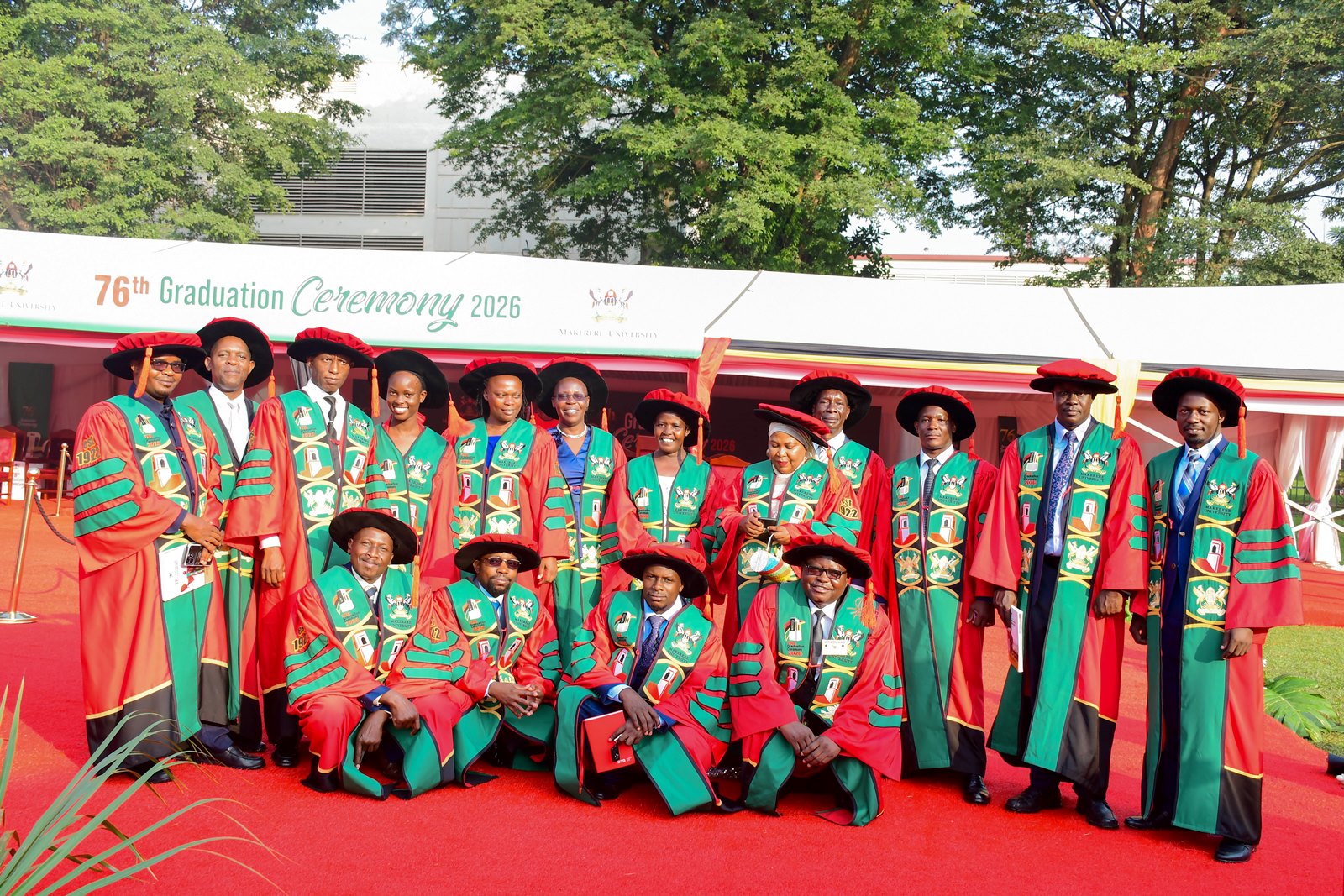
24th February 2026– Makerere University officially commenced its 76th Graduation Ceremony, setting the stage for a four-day celebration of academic excellence scheduled to run until 27th February 2026. The landmark event brought together government and university officials, faculty, staff, graduands, parents and guardians, development partners, and the media, in a vibrant display of achievement. A total of 9,295 graduands were presented by the respective colleges for the conferment of degrees and the award of diplomas and certificates.
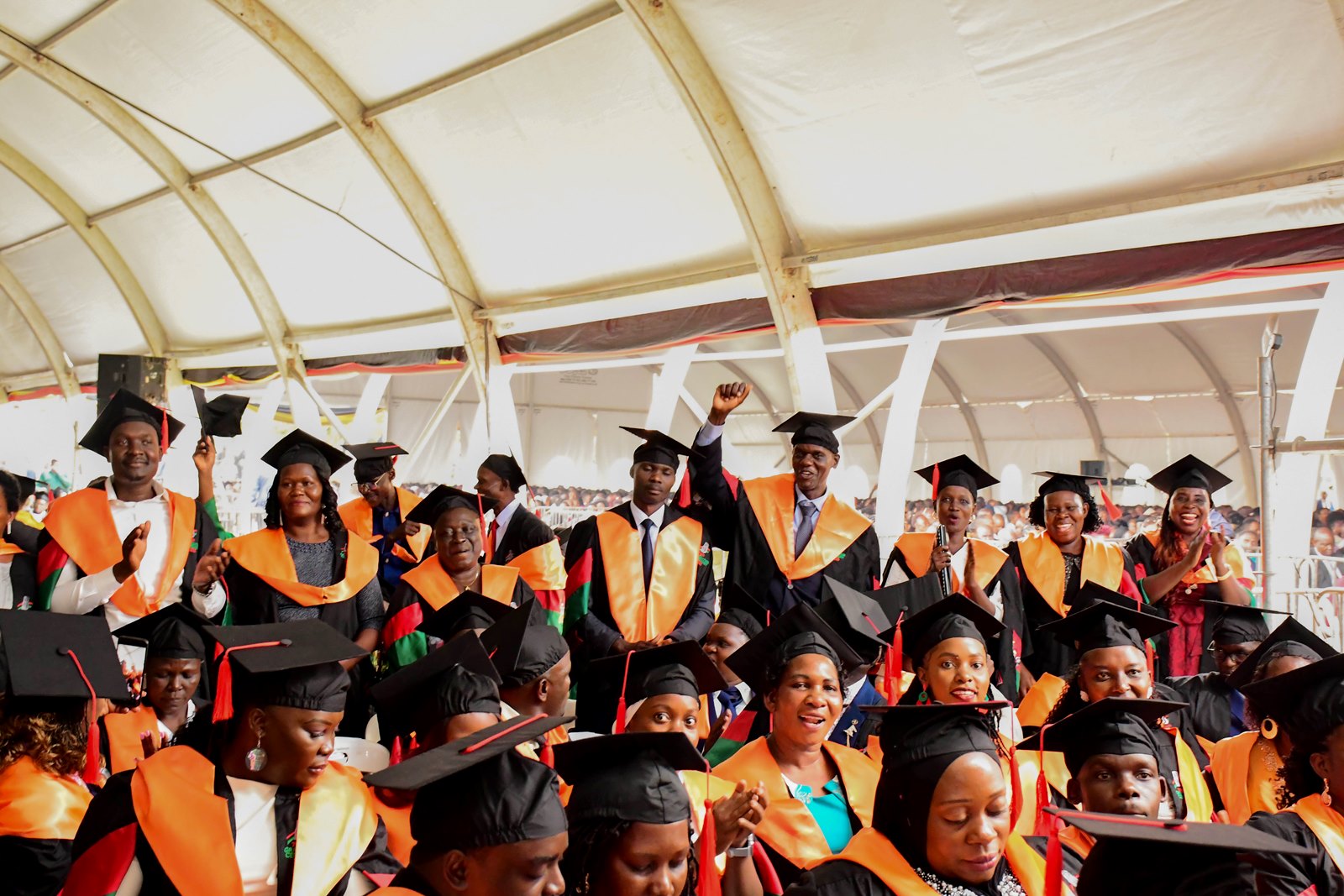
On the first day, presided over by the Chancellor, Hon. Dr. Crispus Kiyonga, the congregation at the Freedom Square witnessed Principals, Deputy Principals, Deans and faculty presenting students for graduation from the following colleges: Agricultural and Environmental Sciences (CAES), Education and External Studies (CEES), Computing and Information Sciences (CoCIS) and the School of Law.
CEES Graduation Statistics
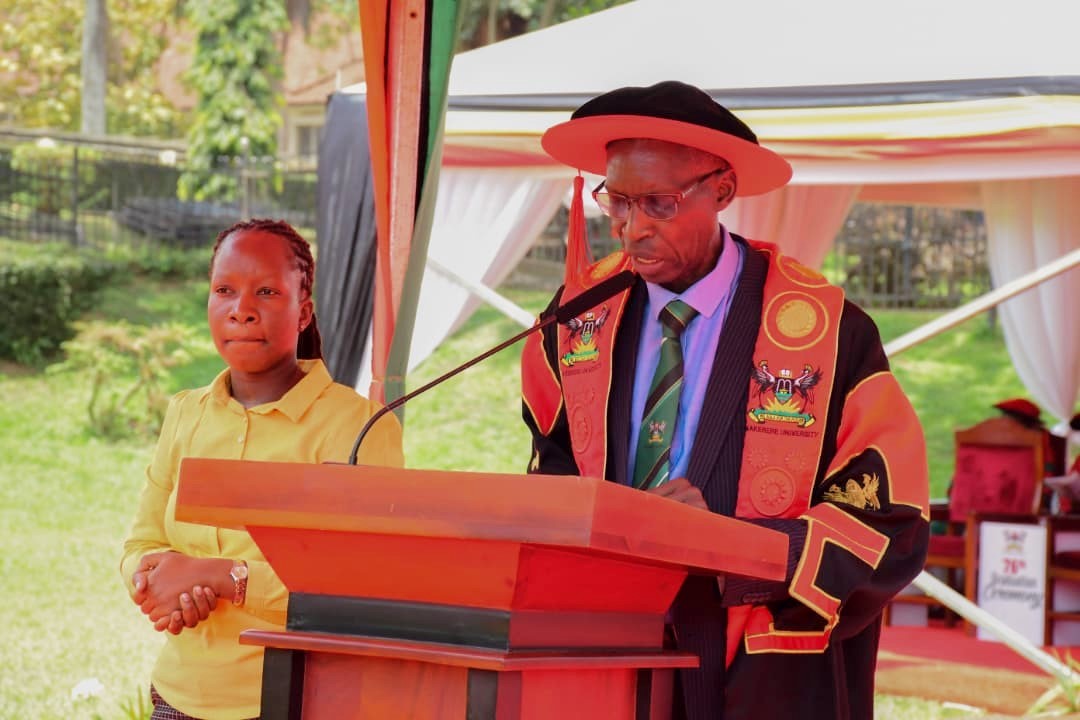
The College of Education and External Studies (CEES) presented 824 graduands for the conferment of degrees and the award of diplomas. These included 27 Doctor of Philosophy (PhD) degrees, 106 Master’s degrees, 111 Postgraduate Diplomas, 572 Bachelor’s degrees, and 8 Diplomas—a reflection of the College’s strong postgraduate research profile and its continued investment in advancing professional and teacher education.
CEES champions digital transformation and Competence-Based Education
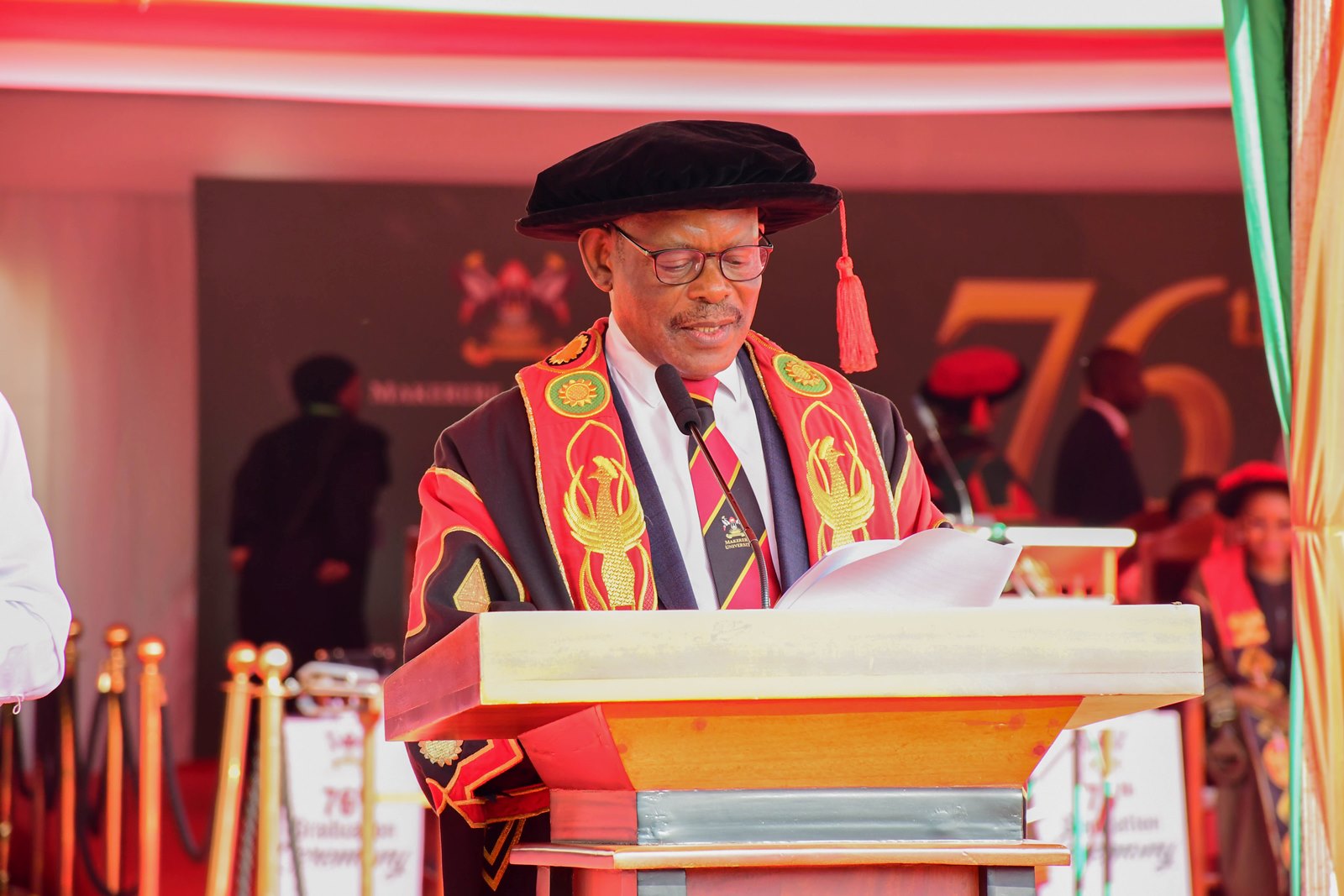
Addressing the congregation, the Vice Chancellor of Makerere University, Prof. Barnabas Nawangwe, underscored the strategic role of the College of Education and External Studies (CEES) in driving the University’s digital and pedagogical transformation. He observed that CEES has remained at the forefront of championing Makerere’s digital agenda, notably through the institutionalisation of the Institute of Open, Distance and eLearning.
“The College of Education and External Studies continues to play a pivotal role in Makerere University’s digital and pedagogical transformation by Championing the digital transformation of Makerere University. In pursuit of digital transformation, Makerere University institutionalised the Institute of Open, Distance, and eLearning effective January 1, 2025. The College, through the Institute of Open, Distance, and eLearning, in collaboration with the College of Engineering, Design, Art and Technology (CEDAT), is implementing a KOICA-funded project aimed at enhancing the distance education environment at Makerere University,” Prof. Nawangwe said.
The Vice Chancellor noted that the initiative reflects Makerere’s deliberate shift towards innovative, technology-enabled learning models designed to expand access, enhance quality, and position the University as a leader in digital higher education in the region.
He explained that the initiative has already yielded significant milestones, including the development and approval of a 10-year Distance Education Master Plan (2025–2035), the construction of a four-storey Open, Distance and eLearning Centre, and the capacity building of academic staff in multimedia e-content production.
He emphasized that these efforts, alongside the ongoing Phase II of the eLearning Initiative supported by the Mastercard Foundation, demonstrate Makerere’s resolve to integrate online and face-to-face learning in expanding access to quality higher education.
Affirming CEES’ growing continental stature, the Vice Chancellor applauded the College for its leadership in advancing Competence-Based Education (CBE) across Africa. He reported that in 2025, CEES successfully coordinated eight partner institutions and secured a prestigious €1 million ERASMUS+ grant to spearhead the institutionalisation of CBE in East and West Africa.
Through the Transitioning Higher Education Regulators and Universities to Competence-Based Education (TRUCE) initiative, he noted, the College is working collaboratively with regulatory bodies, universities, and industry stakeholders to realign teaching methodologies, assessment frameworks, and digital integration towards demonstrable learner competencies that respond to labour-market demands and societal priorities.
Graduates urged on entrepreneurship and employment
To the graduates, Prof. Nawangwe reminded them of the prestige and responsibility that comes with a Makerere degree, “You are graduating with a degree from one of the best universities on earth. We have equipped you with the knowledge and skills that will make you employable or create your own businesses and employ others. Do not despair if you cannot find employment; instead reflect on the immense opportunities around you and rise to the occasion as an entrepreneur. Do not despise humble beginnings. To the graduands of PhDs, you are now global science citizens. Africa expects much from you. Use your degree to transform our Continent.”
Funding of Research and Innovation
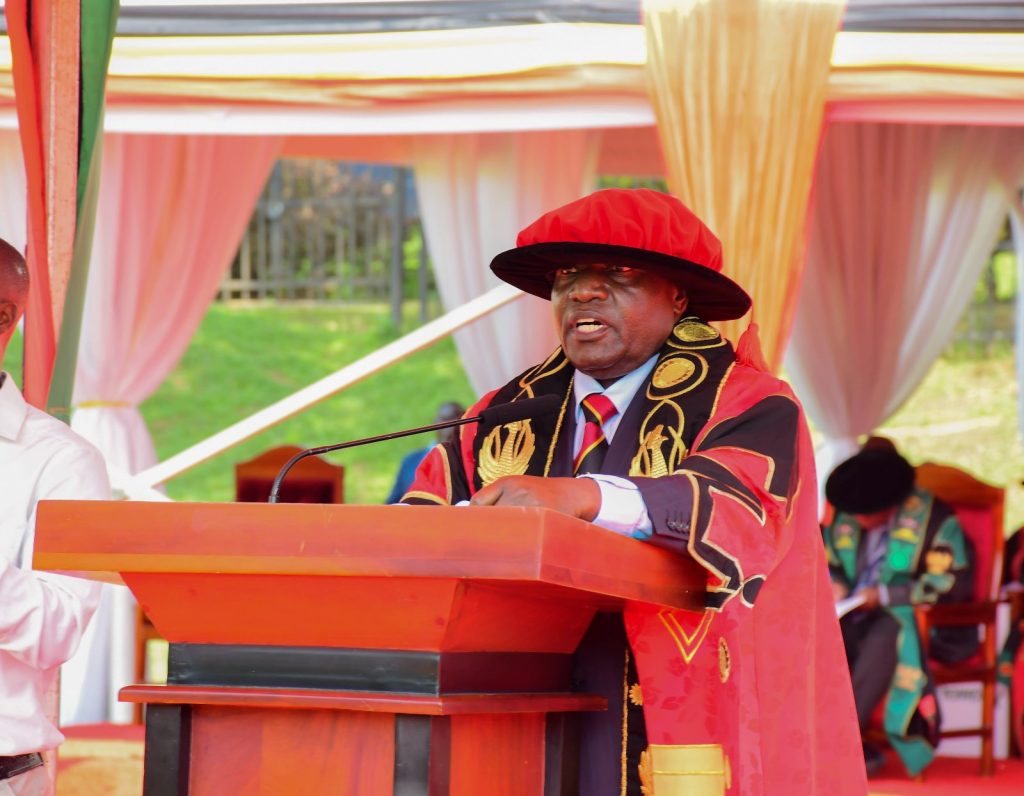
The Chancellor, Hon. Dr. Crispus Kiyonga stated that research plays a very vital role in the development of any community. In this regard, the Chancellor thanked the government of Uganda for committing UGX 30 Billion through the Makerere University Research and Innovation Fund (MakRIF). He lauded the Ministry of Science, Technology and Innovation Secretariat-Office of the President for supporting research initiatives at Makerere University aimed at promoting home grown solutions to our various challenges.
The Chancellor called upon the graduates to tap into opportunities at the University to broaden their knowledge on the world, communities and societies.
Government Commits USD 162 million concessional loan for Laboratory and Infrastructural development, orders shift to Competence-Based Education.

The Guest of Honour, Hon. Janet Kataaha Museveni, Minister of Education and Sports and First Lady of Uganda, represented by State Minister for Primary Education, Hon. Dr. Joyce Moriku Kaducu, commended Makerere University for its pivotal role in nurturing leaders, sharpening scholars, and giving direction to dreams. She congratulated the University Council, management, staff, and graduands for their dedication, noting that Makerere continues to serve as a model institution for academic excellence and national development.
Addressing the transition to Competence-Based Education, the Minister restated the directive that all higher education institutions must prepare for full implementation of Competence-Based Education and Training by July 2027. She urged Makerere University, and particularly CEES, to lead in curriculum reform, staff training, and infrastructure development to ensure graduates are equipped with practical skills, innovation, and problem-solving abilities.
“As we celebrate today’s achievements, we must also look far to the future. I reiterate a key directive from the Ministry of Education and Sports: all institutions of higher learning must prepare for the full implementation of Competence-Based Education and Training by July 2027. This is not merely a policy change; it is a fundamental shift in how we prepare our graduates. We are moving toward a model that emphasizes practical skills, innovation, and problem-solving. I request the Vice Chancellor and your team to lead the way in curriculum reform, staff training, and infrastructure development to make Competence-Based Education (CBE) a reality,” she said.
The Minister highlighted the Government’s deliberate investments in higher education, particularly in research, innovation, infrastructure, and academic development. She underscored key initiatives including the Makerere University Research and Innovation Fund (Mak-RIF), which supports high-impact research and innovation addressing national priorities, and the USD 162 million concessional loan for modernizing university infrastructure, including state-of-the-art laboratories and smart classrooms. The minister reaffirmed the Government’s commitment to strengthening higher education through research funding, digital transformation, and strategic partnerships, emphasizing that universities must not only produce graduates but also solution-makers and job creators.
In her message to the graduands, the minister urged graduands to use their degrees to solve problems and create jobs, emphasizing the need for innovators, engineers, healthcare professionals, and educators. She encouraged them to stay adaptable, creative, ethical, and committed to lifelong learning, while seizing opportunities like the Parish Development Model to drive sustainable community transformation.
Commencement Speaker encourages Knowledge with Purpose and Service with Integrity
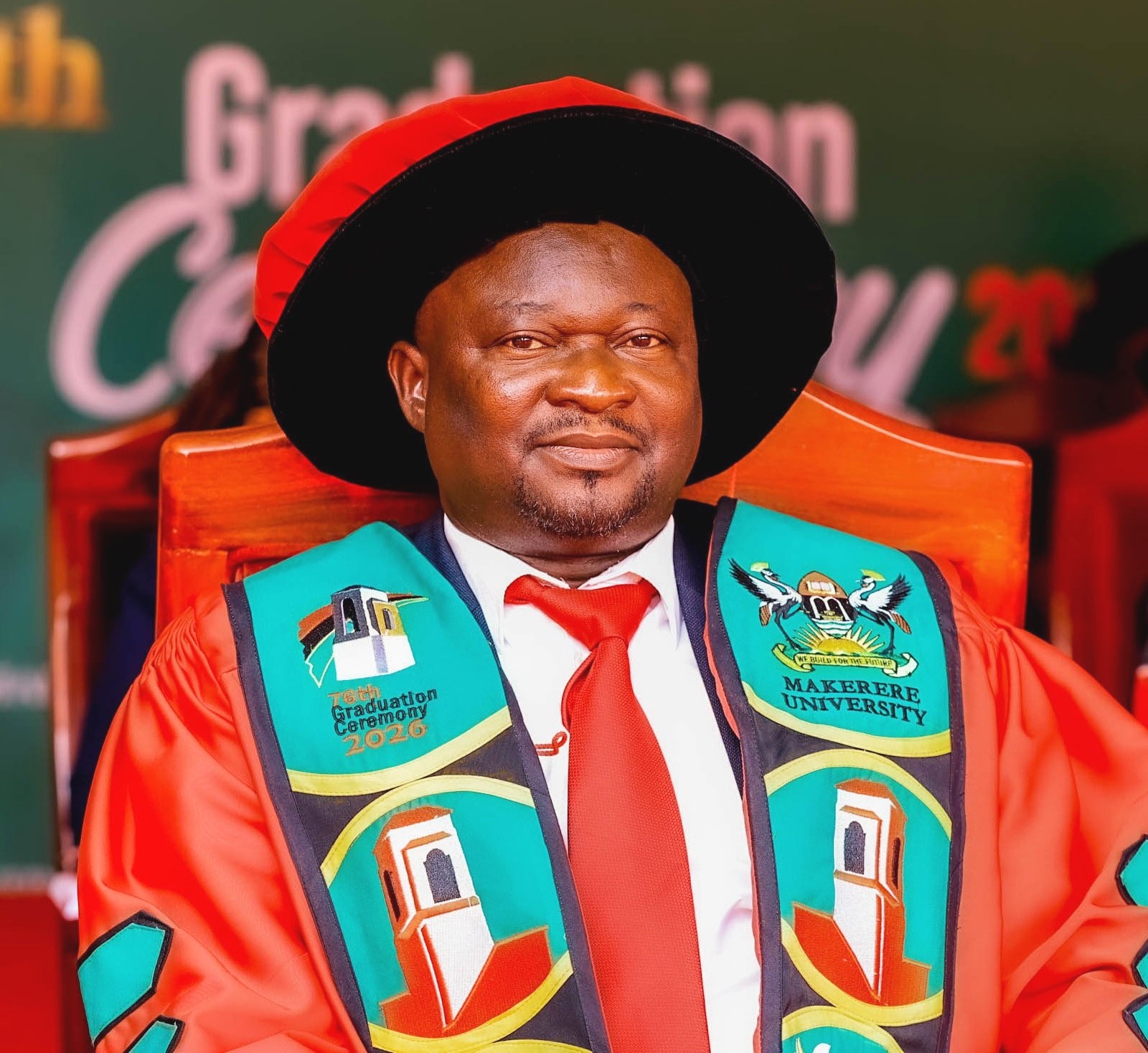
Delivering the commencement address under the theme “Knowledge with Purpose, Service with Integrity”, Prof. Nicholas Ozor, Executive Director of the African Technology Policy Studies Network, reminded graduates that Makerere University has long been a beacon of scholarship and a home for thinkers, innovators, reformers, and leaders. From its halls have emerged presidents, jurists, scientists, educators, technologists, and agricultural pioneers whose work has shaped Uganda, the continent, and the world. Prof. Ozor informed graduands of the storied legacy they had joined, marking both the end of one chapter and the beginning of another; one that demands knowledge, courage, creativity, integrity, and service.
“From these halls have emerged presidents, jurists, scientists, educators, technologists, and agricultural pioneers whose ideas have shaped not only Uganda, but the continent and the world. Among those who studied here are former Presidents such as Julius Nyerere, Mwai Kibaki, Milton Obote, Benjamin Mkapa, and Joseph Kabila. Graduates, today you join this storied legacy of a great citadel of learning. This moment did not come cheaply. It was earned through late nights, failed attempts, financial strain, resilience, and persistence. Today we celebrate your achievement—but even more, we recognize your responsibility,” he articulated.
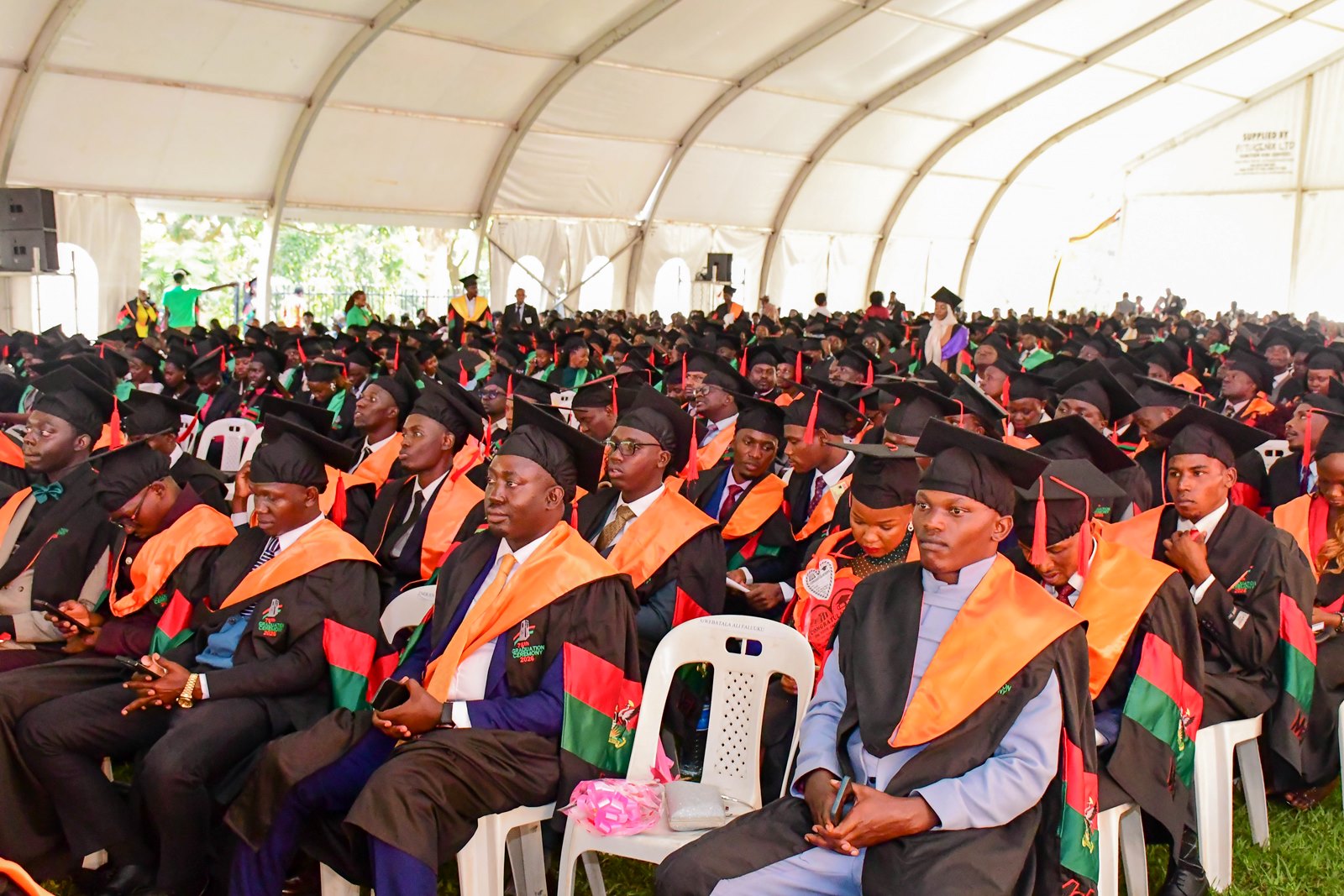
Addressing the CEES graduands, he emphasized that they are custodians of the future, noting that the quality of teachers directly shapes the future of nations. He urged them to never underestimate the power of the classroom, to teach not only for examinations but for understanding, to teach both content and character, and to cultivate critical thinking rather than rote knowledge. He described education as quiet work whose impact echoes across generations.
Beyond CEES, Prof. Ozor delivered key lessons for all graduates, stressing that character, integrity, humility, and resilience will outlast certificates and grades. He encouraged them to embrace lifelong learning, choose purpose over comfort, build character before career, serve something larger than themselves, and believe in Africa by taking initiative to solve its challenges. He pointed out that failure is part of growth, urging them to let it refine rather than define them.
He acknowledged the sacrifices of parents and guardians, noting that their financial, emotional, and spiritual support is embedded in every certificate awarded. Prof. Ozor concluded with a call for graduates to carry the values of Makerere into the world, whether in government, private sector, civil society, academia, or entrepreneurship. He encouraged them to build justice, minds, systems, and sustainable futures, honoring their families, their nation, and the University itself, reminding them that the future is watching and waiting for their contribution.
Photo Credit: Christopher Kaahwa – Communications Practitioner
Education
Facilitating Access and Participation through Higher Education Access Programmes and Connected Education for Students with Refugee Backgrounds: A Global South Delphi Study
Published
2 months agoon
December 19, 2025
On 17th December 2025, a Delphi workshop was convened at Kampala Kolping Hotel, providing a collaborative platform for dialogue on standardisation and harmonisation of Higher Education Access Programmes (HEAP) across institutions, alongside strategies for portability and verification on demand through a HEAP Digital Passport. Discussions centered on accreditation, diversification of delivery and learner support, and future scenarios for HEAP and Connected Education.
Expert panelists underscored the urgent need for:
- Standardised HEAP frameworks across universities to ensure consistency in admission pathways.
- Harmonisation of HEAP curricula, duration, and procedures to eliminate barriers that hinder access and transition.
- Development of a HEAP Digital Passport enabling portability of credentials, secure digital verification, and integration with national qualification frameworks and international recognition systems.
Uganda, is one of the leading refugee-hosting countries with inclusive education policies, faces challenges in ensuring equitable access and participation for students with refugee backgrounds. While some universities offer HEAP as a bridging programme for marginalized learners, variations in programme design, delivery, and support systems still exist, which may lead to violations of accreditation. This calls for urgent standardisation and harmonisation to strengthen HEAP as a recognized transitional pathway into higher education.

Funded by Education Beyond Borders, researchers from Makerere University and the University of Edinburgh engaged stakeholders from public and private universities in Uganda through participatory workshops and expert meetings. This Delphi Workshop aimed providing a collaborative platform for dialogue on standardisation and harmonisation of Higher Education Access Programmes (HEAP) across institutions, alongside strategies for portability and verification on demand through a HEAP Digital Passport. Discussions centered on accreditation, diversification of delivery and learner support, and future scenarios for HEAP and Connected Education. The project is led by Dr. Rovincer Najjuma (Principal Investigator), with co-PIs Dr. Rebecca Nambi and Dr. Michael Gallagher.
Listening to experiences and co-creating solutions

Opening the workshop, Dr. Rebecca Nambi, a Senior Lecturer at Makerere University and Co-Investigator of the project, emphasized that the engagement was not about formal presentations, but about listening to experiences of students with refugee backgrounds that have accessed Higher Education using the HEAP programme and co-creating solutions with Expert Panelists.
Highlighting the persistent disparities in refugee participation in higher education, Dr. Nambi explained that while global and national efforts often focus on primary and secondary education, higher education remains critically under-supported. Drawing on years of research, she observed that refugee participation in higher education has historically stood at three percent (3%), later improving to about seven percent (7%), leaving the highest number of refugees excluded.
“Where do they go if they do not transition to higher education?” she asked. “Who supports them and how do institutions respond when learners arrive with disrupted educational trajectories?”
Shift from mere documentation of marginalization and adversity to practical interventions
Dr. Nambi underscored the importance of moving beyond research that merely documents marginalizationa and adversity. She advocated for practical interventions that improve systems for people with refugee backgrounds and strengthening education for host communities. “Addressing refugee education is part of a broader global agenda shaped by migration, conflict, and labour mobility in several countries.”
Dr. Nambi emphasized that HEAP provides a legitimate pathway for students with refugee backgrounds, and the ongoing adjustments aim to align the program with national standards and student needs.
Central to the discussion was the concept of connected learning, which promotes flexible, blended, and digitally supported education pathways that link learners across institutions, resources, locations, and systems.
Referencing the Makerere University E-Learning Environment (MUELE) as a key enabler of digital and interactive learning between lecturers and students at Makerere University, Dr. Nambi urged other universities to explore such a digital approach to catalyze the delivery of HEAP programmes. She noted that connected education is not solely about technology, but about harmonization, recognition, and collaboration among universities and regulators.
Comparing public and private universities, Dr. Nambi observed that private universities often have more flexible access pathways, and urged that documentation of students’ experiences of HEAP is critical to understanding gaps in provision, delivery and support
“Much of our work has involved examining how Makerere University and other universities are handling access for vulnerable students. We want to document lived experiences, analyze what is working and what is not, and generate evidence that can inform policy and institutional practice,” Dr. Nambi explained.
HEAP Emerging Challenges, lived experiences and future
Moderating one of the key sessions, Dr. Rovincer Najjuma, the Principal Investigator and a Lecturer in Digital Education and the Global South at the University of Edinburgh, guided participants through delphi workshop activities; these included engaging panelists in articulating expectations, uncertainities and risks, and developing future scenarios for HEAP accreditation, diversification of delivery and support and connected education.

Using participatory methods, participants shared insights through post-it notes and group reflections, capturing perspectives from expert panelists, HEI administrators, and students with refugee backgrounds. Dr. Najjuma encouraged an open dialogue, ensuring that student voices, particularly those with refugee backgrounds were centred in the conversation by encouraging them to share their experiences and journeys of participating in HEAP programmes.
The panelists acknowledged that while the HEAC has changed the nomenclature from HEAC to HEAP, programmatic provisions need to evolve, to address the inconsistencies that remain with respect to how institutions implement HEAP, duration, curriculum, and transfer of HEAP credit across institutions. Panelists shared about the critical gaps in awareness, mentorship, orientation, and institutional readiness to implement HEAP in ways that support refugee learners effectively.

On the issues faced by students with refugee status, participants identified several recurring challenges affecting access to and participation in higher education. These included low awareness of the HEAP programmes, fragmented and uncoordinated information dissemination, and difficulties in credential recognition and transfer across institutions and country host-country education systems.
Students highlighted low self-esteem, identity struggles, and stigma, especially where access programmes are perceived as inferior to Advanced High School Certificates. They also cited financial barriers, limited digital access, mental health challenges, and lack of learner-centred teaching approaches.
Key outcomes from the workshop
Panelists outlined key expectations to strengthen access and participation, which included the development of a standardized national HEAP curriculum, with clear and uniform entry requirements, and seamless credit transfer across institutions and host countries, facilitated by the development of HEAP Digital Passport.
Mentorship emerged as a cornerstone of learner support, alongside extended orientation programmes, life skills training, and entrepreneurial education. Participants emphasized the need for blended and online learning, supported by affordable internet access and institutional investment in digital infrastructure.
Policy coherence, stakeholder engagement in policy formulation, and timely communication of reforms were identified as essential for successful implementation. Participants called for gender-sensitive curricula, student representation structures, humane and trauma-informed teaching staff, and adequate learning resources, including reference materials.
HEAP: A Structured Pathway to Higher Education
Dr. Gidraf Joseph Wanjala, Principal of the College of Education, Open and Distance Learning at Kampala International University, highlighted the evolution of access programs in Uganda.
“Historically, the higher education access framework was known as the Higher Education Access Certificate (HEAC). Last year, it was updated to the Higher Education Access Program (HEAP), reflecting a shift from a certificate to a full program, approved by the Ministry of Education and Sports,” Dr. Wanjala said.

He explained that HEAP provides structured pathways for students to progress from diploma to bachelor degree levels, from mature entry to degree programs, and from senior secondary school to higher education. “This program is inclusive of refugee students and all marginalized groups, provided there is funding and space. HEAP supports students not just academically, but also through orientation programs, mental health training, reproductive health education, and gender-responsive support,” Dr Wanjala stated.
Challenging Misconceptions

Dr. Derrick Ssekajugo, Chair of the Special Purpose Committee on Academics and Acting Principal of the College of Economics and Management at Kampala International University, addressed public misconceptions about HEAP.
“Some perceive HEAP—or previously HEAC—as only for students who could not succeed in secondary school. That is not the case. For instance, we have students who initially studied Education but through HEAP transitioned into medicine. Today, they are fully qualified professionals,” Dr. Ssekajugo said.
He also highlighted the pedagogical shift from teacher-centred to learner-centred approaches in secondary education and the need for universities to adapt. “Students entering HEAP come with diverse learning experiences, and universities must adjust to integrate them effectively into competency-based programs,” he noted.
Dr. Ssekajugo added that benchmarking with both local and international institutions is critical to identify gaps and best practices, which inform ongoing program improvements and policy reforms.
HEAP and standardization, accessibility and inclusivity
Sharing their vision for HEAP, panelists recommended standardization, accessibility, inclusivity and foundational nature of HEAP. They advocated for a competence-based HEAP, with a standardized curriculum, offline and online access to resource books and materials, diversification of delivery and support through blended learning and a HEAP Digital Passport for portability and verification on demand.
Education
Real life project: Makerere University Vice Chancellor hands over constructed Wall Fence to Makerere College School
Published
4 months agoon
November 13, 2025
By Ritah Namisango and Harriet Musinguzi
On 12th November 2025, Makerere University officially handed over a newly constructed wall fence to Makerere College School. The real-life project was executed by technical students pursuing higher diploma courses in Civil Engineering and Architecture under the Uganda Vocational and Technical Assessment Board (UVTAB). The students are enrolled at the Centre for Lifelong Learning and Teaching, which operates within the College of Education and External Studies (CEES) at Makerere University.
The Centre for Lifelong Learning, in partnership with UVTAB, is involved in implementing real life projects within the communities-a practical approach that ensures that students identify problems within the community, hold collaborative discussions, and come up with projects to solve the problems.
The handover ceremony of the newly constructed Wall Fence was witnessed by key stakeholders that included officials from UVTAB, the College of Education and External Studies (CEES), the College of Engineering, Design, Art and Technology (CEDAT), the leadership of Makerere College School, UVTAB Deputy Executive Secretary and the technical students pursuing the higher diploma in Architecture and Civil Engineering.

The Vice Chancellor of Makerere University, Prof. Barnabas Nawangwe, represented by the Principal of the College of Education and External Studies, Prof. Anthony M. Mugagga, expressed heartfelt gratitude to Dr. Martin Muyingo, Head Teacher of Makerere College School, for providing a valuable learning space to students under the lifelong learning and teaching program. He acknowledged Prof. Dorothy Okello-Chairperson of the Uganda Vocational and Technical Assessment Board (UVTAB), Prof. Moses Musinguzi-Principal of CEDAT, course instructors, and students for their commendable contributions. He noted that the newly constructed wall stands as a testament to the power of lifelong learning and practical teaching.
The Vice Chancellor commended the management and staff of the College of Education and External Studies (CEES) for implementing programmes through the Centre of Lifelong learning, which are aligned to the Makerere University’s Strategic Plan. He observed that the partnership with UVTAB increases the number of students accessing quality education services, enhances lifelong learning, promotes practical education, and contributes to community transformation.

Congratulating the technical students upon this milestone, and in solidarity, the Vice Chancellor wrote: “I am an architect and courses in my profession go deep to my heart. Congratulations to the students, the engineers, and course instructors.”
Prof. Nawangwe emphasized the importance of architecture-related courses and praised Makerere’s longstanding commitment to student-centered learning, innovation, and thought leadership principles that have guided the university for over two decades. He highlighted that Makerere’s strategic direction aligns with Uganda’s National Development Plan IV and Vision 2040, which advocates for inclusive, equitable, and lifelong education. This vision, he said, reflects the aspirations of His Excellency President Yoweri Kaguta Museveni and the Government of Uganda’s education agenda.
He explained that the Centre for Lifelong Learning (CLL) at CEES, serves as a bridge between the university and the community. It offers opportunities to Ugandan youth and individuals who lack the financial means or academic qualifications to access Makerere’s mainstream programs, to join UVTAB technical education programmes, with instructors at Makerere University Centre for Lifelong Learning. Students enrolled in the program typically come from A-level backgrounds or hold certificates from technical institutions.

He highlighted that long before the Government of Uganda, through the Ministry of Education and Sports, restructured the secondary school curriculum to embrace competence-based teaching and learning, Makerere University had already been championing student-centered education. For over two decades, the university has promoted innovation, experiential learning, and thought leadership.

Ms. Jalia Nassaza, the Acting Deputy Executive Secretary of the Uganda Vocational and Technical Assessment Board (UVTAB), emphasized the importance of real-life projects within the Technical and Vocational Education and Training (TVET) curriculum. She explained that these projects enable students to identify community challenges, engage in collaborative discussions, and develop practical solutions ultimately shaping them into holistic professionals. Through this approach, learners gain essential skills in planning, teamwork, and applying theoretical knowledge to real-world scenarios. Ms. Nassaza emphasized the need for an education system in Uganda that equips students to solve local problems and improve their surroundings. “We want to make our education realistic by translating knowledge into solving problems,” she affirmed.

The Principal of the College of Engineering, Design, Art and Technology, Prof. Moses Musinguzi while congratulating the students upon the completed wall fence structure and other projects, noted that as professionals, scientists get a lot of public criticism because they are the core of providing solutions to societal problems. He said the commissioning of the fence was testimony that the university in partnership with UVTAB, was teaching students ways of solving problems around them. He said that as a college, CEDAT provides access to the required infrastructure in the labs, workshops, and studios, as well as technicians who support the teaching.
Prof. Musinguzi said Makerere University was considering a revision of the assessment, making continuous assessment total to 60%, while classwork is rated at 40%. He also mentioned the CEDAT model, whereby the university was considering utilizing students in technical subjects to support the Estates and Works Department in infrastructural maintenance and service works instead of hiring externally, and that students on both Diploma and Degree programs would be engaged. ‘We need to see scientists directly engaged in the development of the country,’ he emphasized.

Speaking on behalf of the instructors, Mr. Barnabas Mabonga highlighted some of the students’ requirements that included the need for basic tools, providing opportunities for their academic progression to degree programs, and strengthening the safety measures. Some of the actual projects that the AVTAB technical students under CEES and CEDAT have worked on at Makerere College School include: a yard constructed at the boys’ hostel, the wall fence, and a drainage system. He said 173 students out of whom 28 are girls, were enrolled in the Civil Engineering and Architecture higher diploma program. He informed the Vice Chancellor and other guests present that the students in the real-life learning and teaching programs were excelling in performance, with a pass rate of 99%.

Dr. Oscar Mugula, Coordinator of the Centre for Lifelong Learning, emphasized the value of community engagement in their academic programs. He noted that the partnership with Makerere College School began two years ago, when students from the center undertook repair works on the school’s infrastructure. The collaboration has proven mutually beneficial, with the beneficiary school experiencing reduced development costs, while students, particularly those studying technical drawing, gained hands-on experience through the perimeter wall project, which contributed to their coursework and project assessments for the year.
In partnership with UVTAB, the Centre for Lifelong Learning offers diploma courses in Civil Engineering, Architecture, and Electrical Engineering. The students pursuing these courses are examined and accredited by UVTAB. Students benefit from experiential learning at CEDAT, where they are encouraged to innovate using affordable, locally sourced materials. They are also placed in real-world workstations and garages to observe best practices and avoid unethical conduct. Graduates of the program either join the workforce or continue their academic journey at the university.

The Center for Lifelong Learning at CEES is charged with the duty to take the university to the community, providing opportunities to Uganda’s youth and persons interested in technical education, who may not have the requisite funds or grades to join the university’s degree programmes. The students on the program are either directly from A-level or other technical institutions.
Trending
-

 Humanities & Social Sciences1 week ago
Humanities & Social Sciences1 week agoMeet Najjuka Whitney, The Girl Who Missed Law and Found Her Voice
-

 General1 week ago
General1 week ago76th Graduation Highlights
-

 Health2 weeks ago
Health2 weeks agoUganda has until 2030 to end Open Defecation as Ntaro’s PhD Examines Kabale’s Progress
-

 Agriculture & Environment2 weeks ago
Agriculture & Environment2 weeks agoUganda Martyrs Namugongo Students Turn Organic Waste into Soap in an Innovative School Project on Sustainable Waste Management
-

 General2 weeks ago
General2 weeks agoMastercard Foundation Scholars embrace and honour their rich cultural diversity
